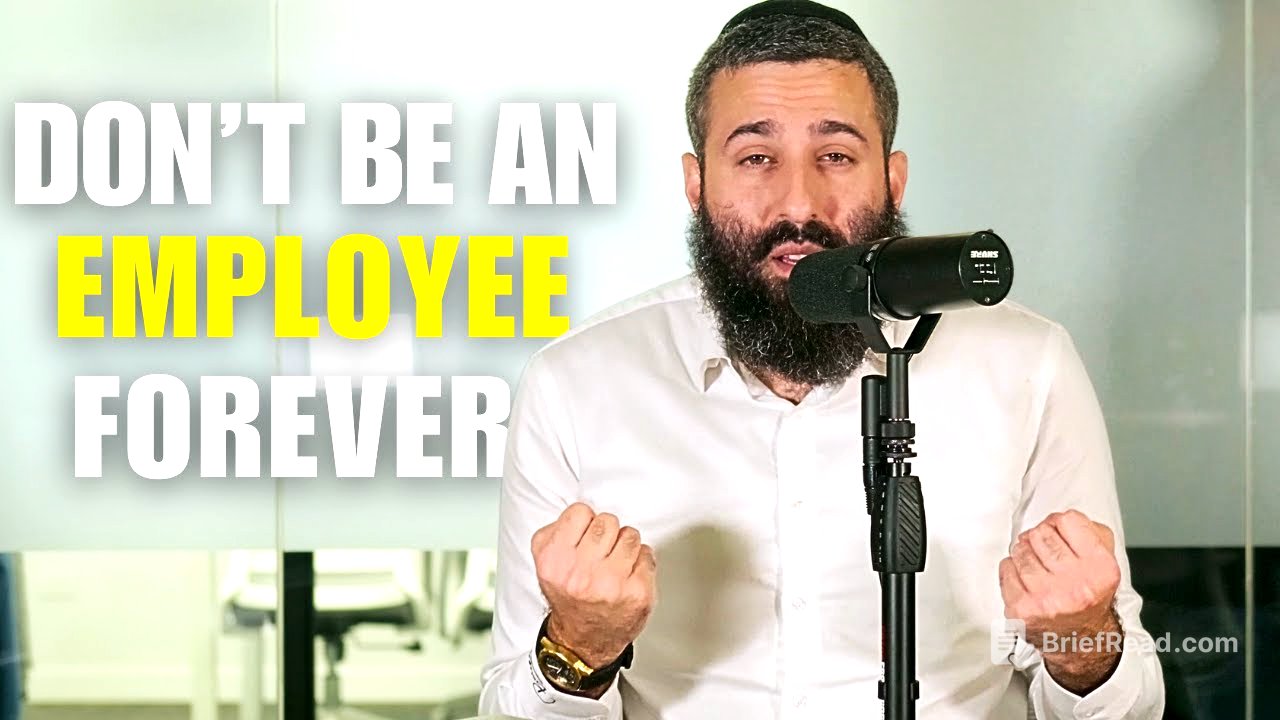TLDR;
The video argues that everyone should aspire to own a business for financial freedom and control over their destiny. It addresses common fears and misconceptions about business ownership, highlighting the risks of relying solely on employment. The speaker shares his personal experience of starting a video production company, offering practical advice on how to identify opportunities, leverage existing networks, and validate market demand.
- Owning a business provides financial freedom and control.
- Employment carries the risk of termination or age-related job loss.
- Starting a business involves identifying opportunities, validating demand, and leveraging networks.
The Case for Business Ownership [0:00]
The speaker believes that everyone should aim to own their own business, viewing it as a path to greater control and security. He acknowledges the value of working for other companies initially, particularly between the ages of 18 and 25, to learn various business functions like accounting, sales, marketing, and HR. This learning phase provides a foundation for eventually starting a business, ideally in a related field where existing knowledge and contacts can be leveraged.
Why Not Everyone Should Be an Employee [1:04]
The speaker challenges the notion that business ownership isn't for everyone, arguing that this mindset often stems from complacency and fear of the challenges involved. While employment offers the comfort of a regular paycheck without the immediate stresses of taxes, customers, and employees, it carries significant long-term risks. Employees face the possibility of being fired, job termination due to restructuring or bankruptcy, or age-related job loss later in their careers. The speaker, drawing from his experience in recruitment, notes the difficulty older individuals face in finding new employment, highlighting the vulnerability of relying solely on a job.
Starting Your Own Business: A Practical Approach [2:43]
The speaker demystifies the process of starting a business, emphasising that it's simpler than many believe. He uses the analogy of an employee as a business ("Mr. You") with a single client (their boss), highlighting the risk of losing all income if that client terminates the relationship. Owning a business, in contrast, involves working for multiple clients, providing a more stable revenue stream. He shares his personal experience of leaving his family business and starting a video production company, driven by his wife's support and a desire for greater autonomy.
From Brainstorming to Securing Initial Contracts [5:05]
The speaker describes his initial steps in starting his video production business. He began by brainstorming potential business ideas, eventually focusing on video production due to his prior experience and interest in the field. Crucially, he advises against abandoning a current income stream until a new one is secured. While still working at his family business, he contacted friends and family to secure six initial video production contracts. This bridge allowed him to transition smoothly into his new venture upon leaving his family business.
Building a Business Through Relationships and Marketing [7:31]
The speaker recounts how, despite only two of the initial six contracts materialising, those two contracts provided enough financial runway to learn and grow. His first sales were to his father-in-law and a friend, providing crucial early income. He continued to leverage his existing network from his family business, selling video production services to former clients. Once this "power base" was exhausted, he expanded his marketing efforts to LinkedIn, Facebook, Instagram, and YouTube, sharing his experiences and journey. This transparency fostered an emotional connection with his audience, leading to new business opportunities. His video production business eventually generated nearly $2 million in annual sales.
Identifying Opportunities and Validating Demand [10:17]
The speaker outlines his method for identifying new business opportunities, which involves creating a list of interests, assessing profit margins, evaluating competition, and determining market demand. He emphasises the importance of validating demand by directly contacting potential buyers. A simple test is to make 10 phone calls to qualified buyers; if at least three express interest, it suggests a viable business opportunity.
The Overarching Goal: Business Ownership [11:19]
The speaker reiterates his belief that everyone, regardless of age, should strive to start their own business as a primary goal. While acknowledging the stresses and headaches that come with business ownership, he argues that they are preferable to the anxiety of potential job loss as an employee. He encourages viewers to pursue their business ventures, promising financial freedom and control over their destiny.









